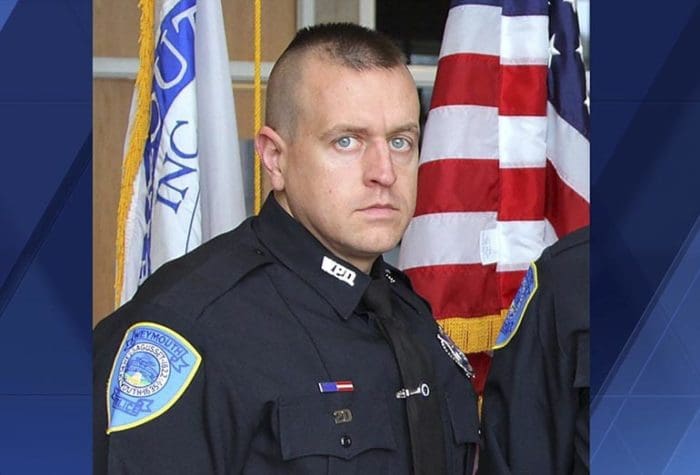Police officer, bystander shot, killed in Weymouth; suspect in custody
Suspect disarmed and murdered a police officer and an innocent woman . . .
Authorities say Weymouth police received a call around 7:30 a.m. about an erratic driver in the area of South Shore Hospital. The driver was involved in a single-car accident and was seen leaving the car on foot.
Officers began searching for the suspect when Officer Michael Chesna, 42, located the suspect, identified as Emanuel Lopes, 20, in the area of Burton Terrace vandalizing a home.
Authorities say Chesna got out of his cruiser, drew his firearm and told Lopes to stop when Lopes attacked Chesna with a large stone, striking him in the head. Chesna fell to the ground and Lopes took Chesna’s gun and opened fire, hitting Chesna several times in his head and chest.
Chesna was taken to South Shore Hospital where he was later pronounced dead.
Protest after Chicago cops fatally shoot armed man leads to 4 arrests, police say
It’s pretty much The Purge in Chicago every weekend these days . . .
Chicago police fatally shot an armed man Saturday evening, igniting a protest near the scene in the city’s South Shore neighborhood that led to four arrests, officials said.
Officers on foot tried to question the man when the confrontation developed and he was shot, Chicago Police spokesman Anthony Guglielmi said.
Police said the man had been “exhibiting characteristics of an armed person.”
They later determined that the man was carrying a semiautomatic weapon for which he did not have a concealed carry permit, and also possessed magazines of ammunition, Chicago Police Patrol Chief Fred Waller told reporters.
Guns turned in at buy back become art
Apparently people are still doing this for some reason . . .
The sheriff’s office said 126 guns were turned compared to 498 guns turned last year.
Through the Caliber Collection and Foundation, portions of the weapons and case shelling collected from crime scenes are melted down and molded into jewelry and other forms of artwork. The buybacks are funded with proceeds from sales of the Caliber Collection, said founder Jessica Mindich.
“We started out as jewelry for a cause and it grew to a fight for progress and change,” said Mindich, former lawyer and jewelry designer. “Caliber began as an innovative line of jewelry made from guns taken off the streets of Newark and four years later, we’re focusing on America’s hardest hit cities.”
Public university had no evidence to judge student guilty of gun possession, court rules
It’s good to know that due process applies to college students, too . . .
Due process in campus adjudications isn’t just important for sexual-misconduct cases. It also affects other disciplinary matters – and judges aren’t happy when they see it glaringly absent from proceedings.
A New York appeals court ordered the State University of New York-Buffalo to expunge “all references” to its proceeding against a student from his record, and blasted the school for its “cavalier attitude” toward his due process.
Zach Greenberg of the Foundation for Individual Rights in Education summarizes and provides exhibits from the litigation in a blog post this week.
Police questioned undergraduate student Tyrone Hill about his involvement in an incident with a fellow football teammate, Zachary Lefebvre, who was driving both of them home. A police report said the driver got out of the truck and pointed a gun at a group of other football players who were taunting him.
Civil rights and the right to self-defense go hand-in-hand
Huh…we’ve been saying this for the last eight-plus years . . .
Few civil rights leaders confronted Jim Crow more effectively before the rise of Martin Luther King Jr. than T.R.M. Howard (1908-1976). His commanding presence and impressive achievements made him hard to ignore. A respected surgeon, Howard was one of the wealthiest African Americans in Mississippi and headed a successful mass movement for equality under the law.
From the beginning, armed self-defense was as an essential component of the struggle.
Guns were always a key feature of Howard’s life ever since his impoverished childhood in rural Kentucky. Every Sunday his mother gave him a quarter to buy four gun shells. Her instructions were to return with either two rabbits or two squirrels, or one of each, for the dinner table. But the Howard family understood that guns were not just for getting food. They would have agreed with anti-lynching activist Ida B. Wells who, in the 1890s, after blacks in nearby Paducah used guns to drive off attackers, advised that “a Winchester rifle should have a place of honor in every black home, and it should be used for that protection which the law refuses to give.”
